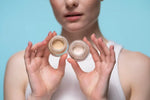
How Do You Choose the Best Makeup for Sensitive Skin?
, by Shopify API, 2 min reading time

, by Shopify API, 2 min reading time
Choosing makeup for sensitive skin can feel overwhelming, but with the right guidance, you can find products that enhance your beauty without causing irritation. In this guide, we'll walk you through essential steps to make an informed decision.
Understanding your skin type is the first step in choosing the right makeup. Everyone's skin is unique, so identifying whether your skin is dry, oily, combination, or simply reactive will help you select products that not only look good, but also feel good.
If your skin reacts easily to many products, it's crucial to choose those specifically formulated for sensitive skin. This includes fragrance-free products that are gentle and contain ingredients that won't irritate.
Review the ingredients and avoid those that can cause irritation, such as fragrances and parabens. A good rule of thumb is to look for products that include natural ingredients, as they tend to be gentler.
Don't hesitate to research each ingredient—it's your skin and it deserves the best! Preservatives and some colorants can also be problematic, so be on the lookout for anything that raises concerns.
Remember that a product may be labeled "sensitive," but that doesn't guarantee it will work for you. Everyone's skin is different, so it's essential to educate yourself.
Opt for makeup labeled as hypoallergenic and non-comedogenic. These products are designed to minimize the risk of allergic reactions and won't clog your pores.
Although hypoallergenic products are generally safer, it's still important to read labels. Sometimes, even "hypoallergenic" formulas can contain ingredients that can be problematic.
Before applying new products, test on a small area of your skin. This can prevent an adverse reaction on more visible areas of your face.
To perform a patch test, apply a small amount of the product to your forearm and wait 24 hours. If there is no redness or itching, it's likely safe to use on your face.
If you have any questions, a dermatologist can help you choose the best option for your skin. They can offer personalized guidance tailored to your specific needs.
A dermatologist can also recommend specific products tailored to your concerns. Don't underestimate the importance of having an expert guide you through this process.
Additionally, if you've had previous reactions to certain products, it's critical to let your dermatologist know so they can help you avoid problematic ingredients in the future.
By following these steps, you can confidently select makeup that suits your sensitive skin needs. Remember, your skin deserves the best care, and the right products can help you shine.